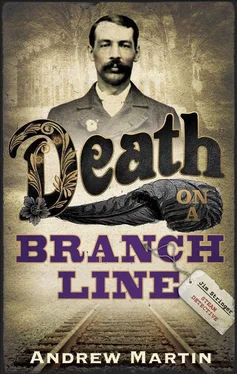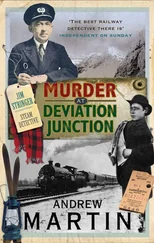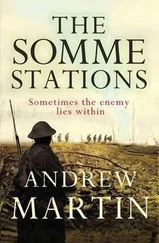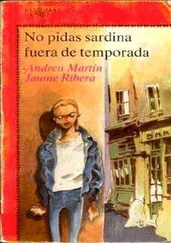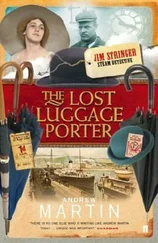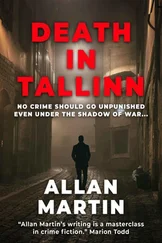Andrew Martin - Death on a Branch line
Здесь есть возможность читать онлайн «Andrew Martin - Death on a Branch line» весь текст электронной книги совершенно бесплатно (целиком полную версию без сокращений). В некоторых случаях можно слушать аудио, скачать через торрент в формате fb2 и присутствует краткое содержание. Жанр: Классический детектив, на английском языке. Описание произведения, (предисловие) а так же отзывы посетителей доступны на портале библиотеки ЛибКат.
- Название:Death on a Branch line
- Автор:
- Жанр:
- Год:неизвестен
- ISBN:нет данных
- Рейтинг книги:5 / 5. Голосов: 1
-
Избранное:Добавить в избранное
- Отзывы:
-
Ваша оценка:
- 100
- 1
- 2
- 3
- 4
- 5
Death on a Branch line: краткое содержание, описание и аннотация
Предлагаем к чтению аннотацию, описание, краткое содержание или предисловие (зависит от того, что написал сам автор книги «Death on a Branch line»). Если вы не нашли необходимую информацию о книге — напишите в комментариях, мы постараемся отыскать её.
Death on a Branch line — читать онлайн бесплатно полную книгу (весь текст) целиком
Ниже представлен текст книги, разбитый по страницам. Система сохранения места последней прочитанной страницы, позволяет с удобством читать онлайн бесплатно книгу «Death on a Branch line», без необходимости каждый раз заново искать на чём Вы остановились. Поставьте закладку, и сможете в любой момент перейти на страницу, на которой закончили чтение.
Интервал:
Закладка:
‘Most of the servants have, I believe.’
‘But not the man who cuts the grass?’
‘That’s Ross’s boy,’ she said, and she nodded to one of the two agriculturals, explaining that they were brothers from West Adenwold, to which they would be returning on foot very shortly, together with the grass-cutter, who was son to one of them. I decided to put them out of consideration, along with the two old maids in the almshouses.
‘I believe there’s a new squire in place of the murdered man,’ I said. ‘But that it’s not John Lambert.’
Mrs Handley folded her arms, and smiled at me as if to say, ‘Well now, you’re quite the dark horse, aren’t you?’
‘That’s Robert Chandler,’ she said, slowly, as though feeling her way. ‘He’s Major Lambert’s late wife’s brother. He’s the new tenant.’
‘Why doesn’t John Lambert have the place?’
‘Oh, he owns it. It’s come to him — only he doesn’t want to live there.’
‘Why not?’
‘Bad memories, I expect.’
‘Does he ever come in here?’ asked the wife.
‘No fear,’ said Mrs Handley.
‘What does he do for a living?’ I asked.
Mrs Handley shrugged.
‘I can’t say. I hardly know him. He’s in London a good deal of the time, and in York most of the rest. They say he keeps heaps of books in the gardener’s cottage, a little way off from the main house.’
‘Sir George Lambert,’ I said, ‘- what was he like?’
Did Mrs Handley colour up at the question?
‘He was a sportsman,’ she said presently, ‘always bucking about on his horse. He had the hunt, which came through on Wednesdays and Saturdays like a great whirlwind; he had his shoots, and he had his cricket games…’
‘This inn is his, isn’t it?’ I said, with the wife eyeing me.
‘’Course it is,’ said Mrs Handley, as if to say, ‘Don’t you know how a village works?’
‘What about his wife?’ asked Lydia, no doubt thinking this would be a subject more to Mrs Handley’s taste.
‘Dead long since,’ said Mrs Handley.
Well, I had read something of the account of her death in Hugh Lambert’s papers — the business of the fire seeming always too cold.
‘And so there was no-one to come between him and the boys,’ Mrs Handley was saying. ‘He was very hard on the two boys — on Hugh especially.’
Mrs Handley had fallen to gazing at Mr Hardy the station master, but I was sure there was nothing in this. He was just a convenient object to look at. Mrs Handley’s earlier sadness had returned, and I could see that it was not on account of the murdered father, but on account of the son who was about to swing for the crime.
‘Would Hugh come in here?’ asked the wife, who, having finally entered licensed premises herself, had evidently become fascinated by the question of who else might or might not do so.
‘Master Hugh?’ said Mrs Handley, and she gave a cautious sort of nod. ‘He’d take a glass, and he’d sit in the public. The public, mark you, not the saloon. He was one of the two young masters, and yet he’d sit in the public bar.’ She smiled, saying, ‘Always wore the same suit — dark blue worsted. Lovely cloth, and yet the trouser bottoms clarted with muck, and all up his black boots. He told me one day: “I always wear a city suit in the country and a country suit in the city.”’
As she spoke, she was preparing a supper for us — two plates of cold ham and salad. She handed them over the bar, saying, ‘What do you reckon to that saying of his? Was I supposed to laugh?’
‘Well,’ I said, ‘I don’t know.’
‘I’ll tell you what — he’d look at me until I did laugh.’
And she was almost laughing now.
‘He meant you to laugh,’ I said.
‘’Course he did. He was always coming out with things like that.’
‘Contradictory,’ I said.
‘And he was just ever such… fun.’
‘Unlike John.’
‘John’s clever,’ she said. ‘Clever people aren’t usually much fun, are they?’
And it was clear from this that she didn’t include me in that category.
I looked over at the clerk-type from Norwood — I was pretty sure he couldn’t hear our conversation, nor was he straining to do so. I somehow didn’t feel I ought to ask Mrs Handley about him and the bicyclist, whereas it was all right to ask about the locals. That was the sort of thing an ordinary tripper might do.
The wife said, ‘Mervyn told us that Master Hugh had given him a dormouse.’
Mrs Handley’s smile disappeared for an instant, but it came back as she said:
‘… Came up here, parked himself down on the bench outside, just next to where Mervyn was sitting. He turns to little Mervyn and he says, “I’ve rather a bad head cold today,” and lifts his handkerchief out of his pocket. Well, the face he pulled when he saw that dormouse curled up in the middle of this most beautiful red silk handkerchief
…’
‘Master Hugh didn’t know it was there?’ I asked.
‘He knew very well it was there. He was play-acting for the boy, don’t you see? It was all for Mervyn’s benefit. Well, it fairly slayed me, that did. I laughed fit to bust.’
‘Was the dormouse dead?’
Mrs Handley stopped laughing, and looked at me in amazement.
‘Of course it wasn’t dead. Where would have been the fun if it had been dead? It was a dormouse. It was asleep.’
Well, this was all apiece with the feeding of the sparrow outside the police office.
‘He doesn’t sound much like a murderer,’ said the wife.
‘Driven to it by the father, I expect,’ said Mrs Handley, in a very business-like way. ‘There’d been aggravation between them for years, and Lambert kept a house full of guns… There’ll be an end to the business on Monday morning, anyhow.’
She gazed at vacancy for a moment, before adding:
‘He’s to be hung on Monday — eight o’clock.’
‘I know,’ I said.
And she eyed me again, perhaps struggling to withhold the question: ‘And how do you know?’
The wife was staring towards the window, picking at her food. Mrs Handley moved off to serve one of the agriculturals, and as she did so the man from Norwood also left the bar. The wife said, ‘I’m going up.’
‘Hold on,’ I said, lifting my pint, ‘I’ll just finish up.’
But she just said, ‘Don’t be long’, and was gone.
I told myself she’d been emboldened to leave my side by the meek-seeming behaviour of our chief suspects: the man from Norwood and the bicyclist. But that might not have been it at all.
Station master Hardy, I noticed, was looking at me along the bar. The moment I returned his gaze he looked away, but not before I could get in the word ‘Evenin”.
‘The soldiers you have at the station,’ I said, moving towards him. ‘What lot are they?’
‘Oh,’ he said, ‘that’s the York and Lancasters.’
It was the Chief’s regiment.
‘Are they set out just anyhow, or is it a model of some particular scrap?’
‘Battle of Tamai,’ he said, for the first time eyeing me directly. ‘Thirteenth of March, 1884.’
Hardy’s tunic was askew, but perhaps it had to be arranged peculiarly to fit round his big belly. He was not drunk, but on the way.
‘I know a fellow was in that very show,’ I said, for the Chief had fought at Tamai.
‘You do?’ said Hardy, and he was different now — sharper. ‘Who’s that, then?’
I couldn’t answer directly without giving away that I was a copper, so I said, ‘… Sergeant major, he was.’
Hardy was now holding my gaze for once. He was almost smiling as he said, ‘Tough as bulldogs, the non-commissioned blokes.’
‘This particular fellow once marched for fifty miles in hundred-degree heat,’ I said, at which station master Hardy eyed me for a while, perhaps idling the thought of that long march.
Читать дальшеИнтервал:
Закладка:
Похожие книги на «Death on a Branch line»
Представляем Вашему вниманию похожие книги на «Death on a Branch line» списком для выбора. Мы отобрали схожую по названию и смыслу литературу в надежде предоставить читателям больше вариантов отыскать новые, интересные, ещё непрочитанные произведения.
Обсуждение, отзывы о книге «Death on a Branch line» и просто собственные мнения читателей. Оставьте ваши комментарии, напишите, что Вы думаете о произведении, его смысле или главных героях. Укажите что конкретно понравилось, а что нет, и почему Вы так считаете.
